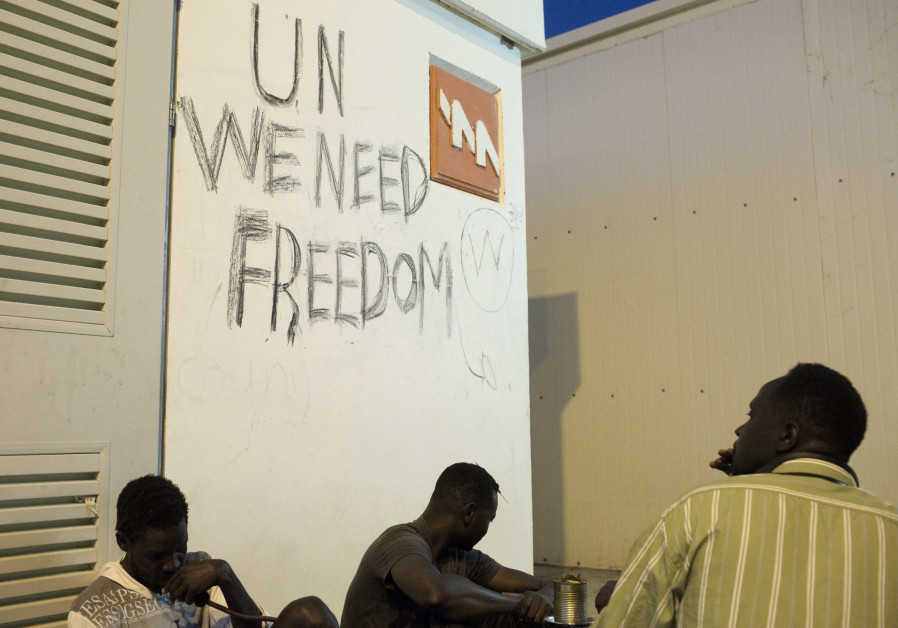Netanyahu was discussing an initiative announced last week by Public Security Minister Gilad Erdan and Interior Minister Arye Deri to close Holot, an “open” detention center.

It is time to increase the pace of deporting African migrants, Prime Minister Benjamin Netanyahu told his cabinet on Sunday.
Netanyahu said that his policy regarding getting migrants to leave the country has three prongs, with the current focus on encouraging most of them to self-deport to a third country – which reports have identified as Rwanda.
In the years leading up to 2012, a flood of African migrants crossed into Israel illegally, at one point reaching around 64,000.
Netanyahu said that the state had already carried out the first two prongs of its strategy: stopping the flow of new migrants by building a wall on the Egyptian border and forcing out over 20,000 migrants who had been inside Israel.
The third stage of deporting migrants at an increased pace, he said, “can be carried out thanks to an international agreement which I obtained which allows us to deport the 40,000 remaining infiltrators against their will.”
“This is very important. This will allow us to empty the Holot Detention Center in the future and to redirect portions of the large resources we are using there from guarding” the migrants to other needs of the state.
Netanyahu was discussing an initiative announced last week by Public Security Minister Gilad Erdan and Interior Minister Arye Deri to close Holot, an “open” detention center where a few thousand migrants have been sent to try to convince them to ”’self-deport.”
Erdan and Deri’s idea would be to offer migrants the choice of “voluntarily” deporting to a third country or being put in regular prison indefinitely.
Responding to Erdan and Deri’s idea last week, various human rights organizations, including the Hotline for Refugees and Migrants, the Association for Civil Rights in Israel, Amnesty International Israel, Kav LaOved, Physicians for Human Rights – Israel, Aid Organization for Refugees and Asylum Seekers and African Refugee Development Center – Israel slammed the initiative.
“The Holot detention center, an isolated prison that was meant to make asylum seekers’ lives miserable, should have been forbidden in the first place. From the words of Minister Erdan, it is clear that the government was lying to the High Court when they denied that the purpose of Holot was to make asylum seekers leave Israel. Holot needs to shut down immediately and instead of a policy of oppression, lies to the High Court, detention and deportation, the government should fulfill the moral and legal obligations of Israel to protect asylum seekers and ensure their right to live in dignity.”
Until now, Israel was only allowed to deport migrants to third countries if they agreed to self-deportation and were not viewed as being coerced.
However, in August, the High Court of Justice both struck down a tougher state policy against migrants as well as implied that if the state managed to get a third country to agree to take migrants in, even if they came against their will, and passed a new law to exploit such a deal, that deportation of migrants against their will could become legal.
The High Court distinguished between deporting migrants to a third country, such as Rwanda, and the migrants’ country of origin.
Israel is a signatory to the Convention on Refugees, which prevents it and other signatories from deporting illegal migrants back to their countries of origin if they would face persecution.
There is an ongoing debate about whether Israel’s migrants, the largest group of whom are Eritrean, fled their home countries due to persecution or to improve their economic status.
Deporting to a third country sidesteps this legal debate.
It is unclear, however, if the High Court would endorse indefinite detention in a regular prison as an alternative to self-deportation.
The High Court has said that one of the reasons that it declared the old state policy unconstitutional was because the state was trying to coerce migrants to self-deport at the same time as having signed a deal with the third country that migrants would only be sent voluntarily. However, it did not explain how far the state could go to “convince” migrants to be deported.
As reported by The Jerusalem Post
